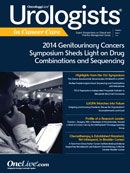Some With Micropapillary Urothelial Carcinoma May Benefit From HER2-Targeted Treatment
Some patients with micropapillary urothelial carcinoma face a three-fold risk of cancer death because their disease amplifies HER2 and overexpresses its protein product, and there may be a role for treatment of the condition with HER2- targeted agent trastuzumab, which has vastly increased the odds of survival for eligible patients with breast cancer.
John C. Cheville, MD
Some patients with micropapillary urothelial carcinoma face a three-fold risk of cancer death because their disease amplifies HER2 and overexpresses its protein product, and there may be a role for treatment of the condition with HER2- targeted agent trastuzumab, which has vastly increased the odds of survival for eligible patients with breast cancer, according to the results of a recent study.
In the study published in Modern Pathology late last year, Schneider et al compared a group of patients with micropapillary urothelial carcinoma against a cohort of patients with typical urothelial carcinoma, to test the frequency of amplification and protein expression and their effect on cancer-specific survival. All of the patients had undergone radical cystectomy at the Mayo Clinic between 1980 and 2008. The investigators assessed HER2 amplification via fluorescence in situ hybridization (FISH) and protein expression via immunohistochemistry.
They found HER2 amplification in 9 (15%) of 61 micropapillary carcinomas compared with 9 (9%) of 100 urothelial carcinomas. In patients with micropapillary carcinoma, HER2 amplification was associated with a nearly three-fold increased risk of cancer death, and on multivariate analysis, it remained associated with an increased risk of death from bladder cancer (hazard ratio 4.3; P = .0008). No association was found between HER2 amplification and cancer-specific survival in patients with typical urothelial carcinoma, the investigators wrote.
The researchers concluded that HER2 amplification is more frequent in micropapillary urothelial carcinoma than in typical urothelial carcinoma, and that patients with micropapillary carcinoma who have the amplification face worse cancer-specific survival than those who do not.
“Identification of [HER2] amplification in micropapillary carcinoma could provide important prognostic information and possibly provide a role for [HER2] targeted therapy,” they suggested.
“These findings show it is critical for pathologists to recognize this type of bladder cancer and that providers should be aware of and order the appropriate tests,” added John C. Cheville, MD, a Mayo Clinic pathologist and lead author of the study, in a written statement about the findings posted online by the institution. “This will be essential for any clinical trial examining the effectiveness of trastuzmab in treating MPUC.”




